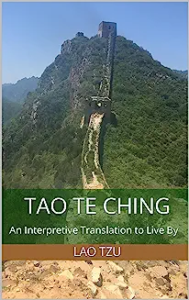
~ What she found in the Chinese characters used by Lao Tzu
~ Why she translated each chapter the way she did
~ The important messages found in the Tao Te Ching
Gemini’s translation of Chapter 20:
Here is a possible translation of the text:
Discarding learning brings no worry.
What is the difference between “yes” and “no”?
What is the difference between good and evil?
What people fear, one cannot not fear.
Vast and endless it seems!
The crowd bustles about,
as if enjoying a grand sacrifice,
as if ascending a spring platform.
Alone I drift, not yet formed,
chaotic like an infant before it can smile,
weary as if having no home.
Everyone has more than enough,
but I alone seem to have been left out.
Am I an idiot?
The common people are bright,
I alone am dim.
The common people are sharp,
I alone am dull.
Vast as the sea,
boundless as if without end.
Everyone has something to use,
but I alone am clumsy and uncouth.
I am different from others,
and I cherish the mother principle.
This translation is based on the interpretation of the text as a commentary on the nature of reality, the relativity of good and evil, and the importance of non-attachment. The speaker is contrasting their own state of understanding with that of the common people, who are seen as being caught up in the illusion of duality and separation.
Here are some additional points to consider:
- The phrase “唯之與阿” (wei zhi yu a) is often translated as “yes” and “no.” However, it could also be interpreted as “affirmation” and “negation” or “acceptance” and “rejection.”
- The phrase “善之與惡” (shan zhi yu e) is often translated as “good” and “evil.” However, it could also be interpreted as “benefit” and “harm” or “construction” and “destruction.”
- The phrase “人之所畏” (ren zhi suo wei) is often translated as “what people fear.” However, it could also be interpreted as “what humans find threatening” or “what causes human suffering.”
- The phrase “眾人熙熙” (zhong ren xi xi) is often translated as “the crowd bustles about.” However, it could also be interpreted as “the masses are infatuated” or “the people are caught up in the illusion of happiness.”
- The phrase “我獨泊兮其未兆” (wo du po xi qi wei zhao) is often translated as “Alone I drift, not yet formed.” However, it could also be interpreted as “I am alone and detached, unformed and unconditioned” or “I am in a state of pure awareness, free from the constructs of the mind.”
- The phrase “沌沌兮如嬰兒之未孩” (dun dun xi ru ying er zhi wei hai) is often translated as “chaotic like an infant before it can smile.” However, it could also be interpreted as “混沌 as an infant before it knows to discriminate” or “in a state of pure innocence, free from the burdens of knowledge and experience.”
- The phrase “儽儽兮若無所歸” (liao liao xi ruo wu suo gui) is often translated as “weary as if having no home.” However, it could also be interpreted as “lost and wandering, without a sense of purpose” or “disconnected from the world, adrift in the vastness of existence.”
- The phrase “眾人皆有餘” (zhong ren jie you yu) is often translated as “Everyone has more than enough.” However, it could also be interpreted as “the masses are consumed by greed and desire” or “the people are attached to material possessions and worldly pleasures.”
- The phrase “我獨若遺” (wo du ruo yi) is often translated as “but I alone seem to have been left out.” However, it could also be interpreted as “I am beyond the need for worldly possessions and pleasures” or “I am content with my own simplicity and lack of desire.”
- The phrase “我愚人之心也哉” (wo yu ren zhi xin ye zai) is often translated as “Am I an idiot?” However, it could also be interpreted as “Am I a fool for not conforming to the ways of the world?” or “Have I lost my mind in pursuit of truth?”
- The phrase “俗人昭昭” (su ren zhao zhao) is often translated as “The common people are bright.” However, it could also be interpreted as “the masses are deluded by their senses” or “the people are trapped in the illusion of separateness.”
- The phrase “我獨昏昏” (wo du hun hun) is often translated as “I alone am dim.” However, it could also be interpreted as “I see through the illusion of separateness” or “I am aware.